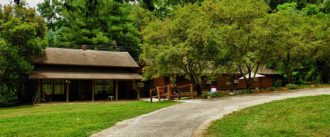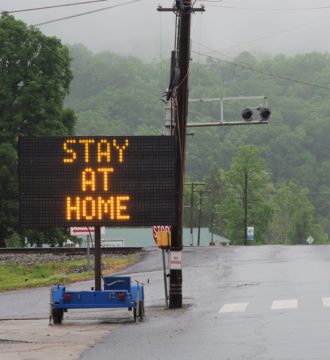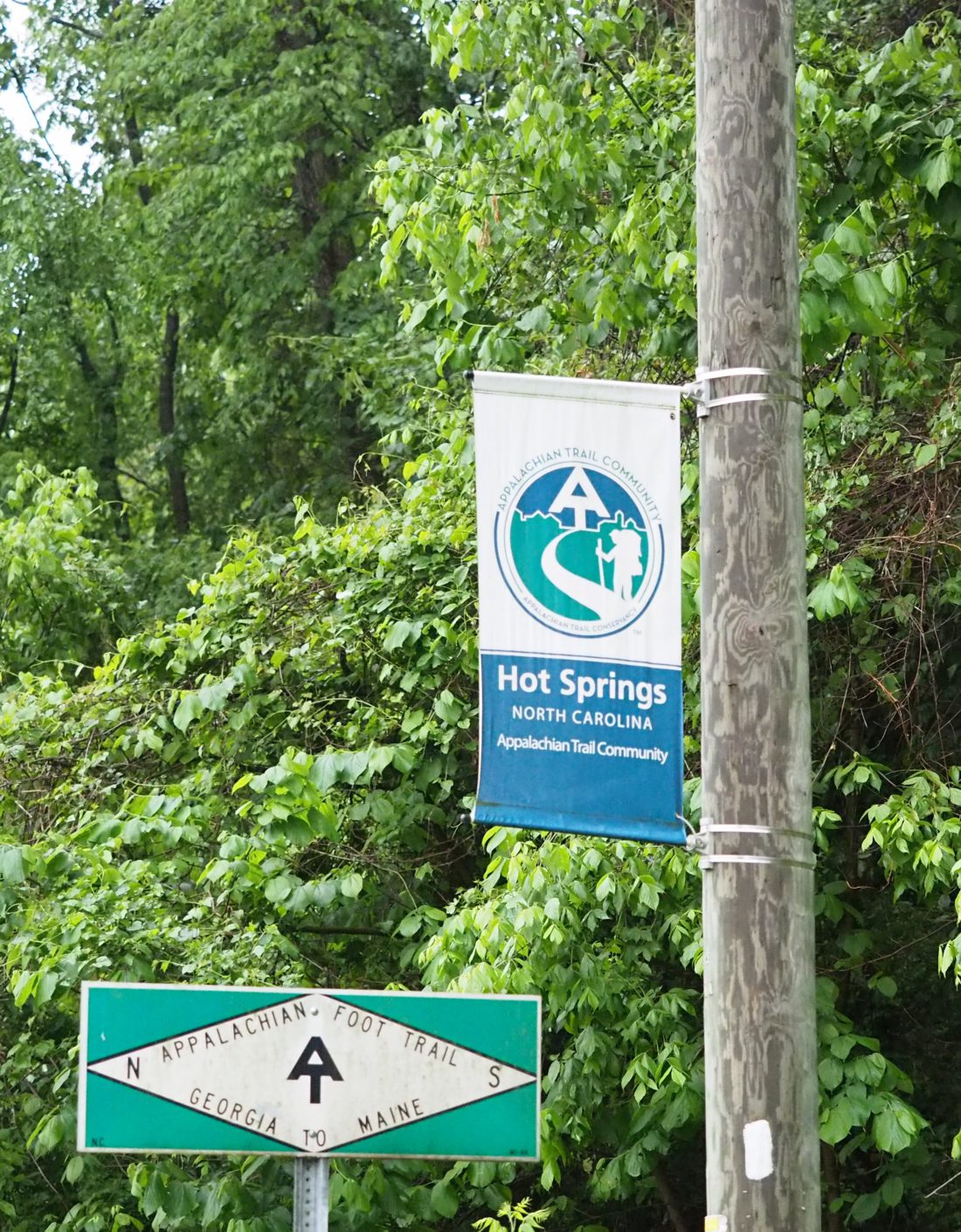Editor’s note: UNC Chapel Hill student Kayla Guilliams provided this report from Hot Springs. Guilliams is currently studying to receive her BA in Environmental Studies with minors in statistics and journalism.
On March 17, a message in bold red popped up on Laughing Heart Lodge’s website.
“NOTICE: For the health and safety of our guests and workers, we must close the Laughing Heart Lodge and Hostel until further notice to help slow the spread of COVID-19,” it read. “Please stay well, and we hope to see you all soon.”
On May 13, five days after Gov. Roy Cooper allowed short-term rentals to reopen, Laughing Heart removed that notice. The Hot Springs lodge and hiker hostel had started taking reservations again. But business remains far from usual.
Hot Springs, located in Madison County about 35 miles to the northwest of Asheville, is a town of about 600 known for its hiking, whitewater and spa. Like many small mountain communities along the Appalachian Trail, its streets are dotted with outfitters, rafting companies and lodging facilities.
As of May 25, according to the N.C. Department of Health and Human Services, there are zero confirmed cases of COVID-19 in Hot Springs, and only three confirmed cases in Madison County. However, the county is still mostly following statewide protocols to help flatten the curve of coronavirus infections, and businesses such as Laughing Heart have borne the impacts.
The lodging facility closed its doors for the first time in 10 years in March after being on track to have its most successful spring and summer to date. The large events and retreats planned at Laughing Heart for the next few months have been canceled, and thousands of dollars in revenue have been lost due to shutting down in what is normally the busy season.
“This time of year, we would be full almost every single night at the hostel,” says Mike Love, who became Laughing Heart’s innkeeper after hiking the Appalachian Trail a few years ago. “March through May is what we call the bubble, when hikers come north from Georgia. Last year, 4,000 came through, so it’s a big financial impact to be closed then.”

Facing this magnitude of economic loss would be detrimental for any small business. But for Laughing Heart, it’s meant more than just unrealized profit. The business was founded to provide funding for the health needs of a Hot Springs resident who suffered a traumatic brain injury in 2003.
For the two months Laughing Heart was closed, the business had to downsize its staff, and Love says he had to take on extra duties while forgoing his usual salary for a time.
The whole town of Hot Springs, Love adds, was desolate during that time. The businesses that dotted Main Street were closed, no cars were parked along the streets, and little to no foot traffic passed on the sidewalks.
“I walked into town in early April on a really cold, rainy day. I looked down Main Street, and there wasn’t a single car,” Love recalls. “Just a flashing sign that said, ‘Stay Home’, and that’s when it all really hit me.”

Laughing Heart has now implemented a reopening plan based on guidance from the federal Centers for Disease Control and Prevention and various hotel associations. The lodge has started taking reservations again, with the first guest coming on May 23, and the hostel has opened to hikers that come through on the Appalachian Trail.
“We are limiting occupancy in the lodge to 10 guests,” says Love. “We have also revamped the check-in process, implemented the recommended social distancing and sanitation procedures and are providing gloves and masks to our few employees and guests who request them.”
Since reopening, Laughing Heart has yet to rehire its landscapers or hostel managers, and its housekeeper will return as needed, according to Love. He says he’s still taking on extra responsibilities as needed at the lodge due to the smaller staff.
Most businesses in Hot Springs have also started to reopen but are operating on limited hours with limited capacity. This has increased foot traffic and business on Main Street, although not to the levels that would usually be seen during the season.
“It’s been a huge blow for the town,” says Love. “You know, it’s a tourist town. There’s only one industry, the Peerless Blower company, that hasn’t been greatly impacted.”
Mayor Abigail Norton agrees that COVID-19’s economic impact has been huge. She thinks things won’t start returning to normal in the town until the Hot Springs Resort and Spa, which plans to stay closed until at least Sunday, May 31, reopens. Norton says most tourists come specifically for the spa and only then end up hiking the local trails, dining at local restaurants, shopping at local businesses and making reservations at short-term rentals such as Laughing Heart.
“The resort and spa brings in maybe 50% of our one- and two-night customers,” notes Love. “They come specifically for the spa and then make reservations here.”
The Appalachian Trail also brings in a lot of business to Hot Springs. The trail carves directly through downtown, a feature shared by just two towns on the entire trail.
Starting in March, large stretches of the trail closed, and the Appalachian Trail Conservancy encouraged all hikers to postpone their expeditions due to COVID-19. Some stretches of the trail are barely a foot wide, according to Love, and many hikers aggregate in large groups, making it hard to practice social distancing.
The ATC continues to advise avoiding the trail, but hikers have started returning as states start reopening. According to Love, the trail’s Hot Springs portion is no exception. He notes that 10 hikers have stayed at the Laughing Heart hostel since May 13.
Despite businesses opening up and more tourists and hikers coming into town, it will take a long time for Hot Springs to fully recover. The threat of COVID-19 remains, making people fearful to travel anywhere, even to places with no confirmed cases.
Although the future is uncertain, Love is staying optimistic for Hot Springs and Laughing Heart. The lodge still has events and retreats booked for later this year, and reservations are slowly starting to trickle in.
“I don’t think we’ll recover immediately,” said Love. “But I have to remain hopeful. There’s no other option for me.”
Editor’s note: This story was updated on June 12, 2020, at 10:25 a.m. to remove personal details about a person mentioned in the text.
Kayla Guilliams is an experienced environment and science writer based in Chapel Hill, NC. She is currently studying to receive her BA in Environmental Studies with minors in statistics and journalism at UNC Chapel Hill, and will start coursework for her MA in Environment and Science Journalism this fall. You can view her portfolio here.




Before you comment
The comments section is here to provide a platform for civil dialogue on the issues we face together as a local community. Xpress is committed to offering this platform for all voices, but when the tone of the discussion gets nasty or strays off topic, we believe many people choose not to participate. Xpress editors are determined to moderate comments to ensure a constructive interchange is maintained. All comments judged not to be in keeping with the spirit of civil discourse will be removed and repeat violators will be banned. See here for our terms of service. Thank you for being part of this effort to promote respectful discussion.